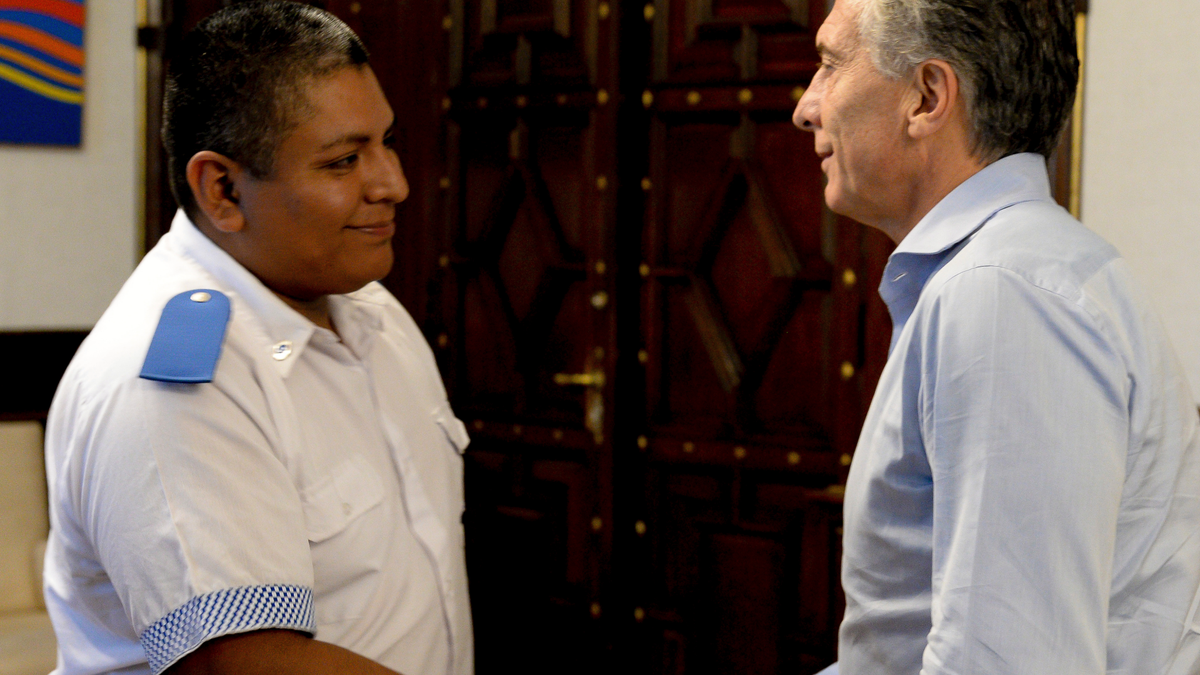
BUENOS AIRES, Argentina – A photograph of Argentina's president shaking hands with an off-duty police officer who fatally shot a man in the back after he stabbed and robbed a U.S. tourist has triggered a heated debate over the limits of a crackdown on crime.
The government said the only objective of the presidential encounter was to highlight the hard work of the nation's security forces and dispel the notion that officers should always be blamed in such incidents.
Human rights advocates, however, fear that President Mauricio Macri's support gives police a green light to shoot first and ask questions later. They say it sets a dangerous precedent in a country haunted by memories of human rights abuses by authorities during the 1976-1983 dictatorship.
Police officer Luis Chocobar shot 18-year-old Pablo Kukoc on Dec. 8 after he injured American citizen Joe Wolek in the La Boca district of Buenos Aires, which draws tourists to stroll its narrow streets lined with colorful buildings. The scene was captured by surveillance cameras and has been played repeatedly across Argentina, where crime is a top concern.
While the family of the teenager decried his killing, Macri angered many last week when he welcomed Chocobar to the presidential palace and called him a hero. Macri also blasted the judge who formally accused the officer in a criminal case.
"I wanted to offer him my full support, and tell him that we're with him and that we trust that the justice will absolve him of any charge, recognizing his courage," Macri said on Facebook, along with the photograph that got more than 9,000 likes — more than double for the president's usual posts.
Security Minister Patricia Bullrich said the photo ratifies the government's position that security forces are not always the guilty ones. "We're changing this doctrine that said police were always to blame."
Such tough words are welcomed by many Argentines who are weary of crime.
But human rights groups say it sends the wrong message in a country where thousands were killed and forcibly disappeared during its so-called Dirty War.
"It's assumed that every time a uniformed (officer) kills a person it's because of a clash and the behavior is defended as public policy," said Maria Carmen Verdu, a lawyer who is part of the group Coordinator Against Police Repression.
Verdu's group says there have been 725 "trigger-happy" and other police abuses committed since Macri took office in December 2015. That would be the highest since Argentina's return to democracy in 1983, although the Security Ministry says the statistic is false.
Macri, a conservative, has promised to rescue the discredited security forces he inherited after 12 years of rule by Cristina Fernandez and her late husband and predecessor as president, Nestor Kirchner. The center-left presidential couple launched a purge of the police and armed forces that saw many dictatorship-era officials put on trial. They also called for a more flexible interpretation of the law and lighter punishments for criminals, which Macri's government says led to a rise in crime.
Public safety statistics were discontinued during Fernandez's administration and re-established after Macri took office. A 2017 report by the Security Ministry shows a slight drop in the homicide rate and the number of armed robberies compared to the previous year.
Orlando D'Adamo, head of the public opinion center at Buenos Aires' Belgrano University, said rising crime is a hot-button issue because it affects people's everyday lives.
"In Argentina's case, the worsening crime has come in a very short period of time. There are countries in Latin America that have faced this for 50 years. (But here) all of a sudden people have had to incorporate security measures. Concerns cause tensions. Crime makes people very sensitive," D'Adamo said.
The image of Macri shaking hands with the police officer is a powerful communication strategy that has a positive impact in the poorer and middle-class sectors of society, he said.
In another case, the government has publicly backed the actions of federal forces accused in the death of an activist whose disappearance prompted nationwide protests. Authorities said after an autopsy last year that Santiago Maldonado drowned and ruled out foul play, but the case is still being investigated. Maldonado's family says border police killed him, but the force has denied any wrongdoing.
Macri's administration also supported federal agents who clashed with members of the Mapuche indigenous community while trying to evict the activists from lands they seized in a national park. One Mapuche was killed.
"This progressive identification between political authority and police institutions implies in practice an end to controlling the forces, at least when it comes to cases of police violence," the Buenos Aires-based Center for Legal and Social Studies said in a statement.
Despite the criticism, Macri's government seems to prioritize the political gains from its crackdown on crime, especially at a time when Macri's popularity is being hurt by high inflation and rises in utility rates and transportation costs.
D'Adamo said the relationship between civilians and officers in uniform deteriorated during Argentina's dictatorship and these perceptions linger.
"Anywhere in the world, police are there to suppress," he said. "But you say that here and they want to hang you from a tree. Argentina owes itself a profound debate on this issue."
